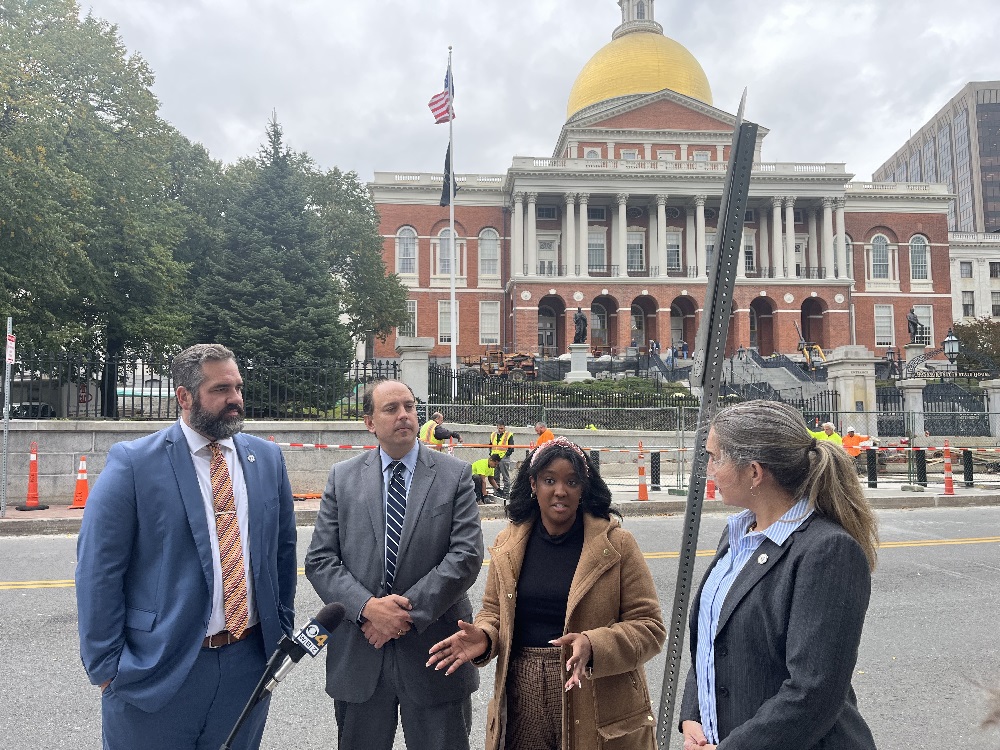latest
Handful of Massachusetts lawmakers join bid to redistribute tax relief

By Sam Drysdale
BOSTON – The day after progressive Democrats introduced a bill to limit the size of tax refunds set this fall to flow back in the largest amounts to the highest earners, bill sponsors say five legislators have so far signed on but there’s “no indication” that top House or Senate Democrats are on board.
Cambridge Rep. Mike Connolly filed the bill (HD 5394) Wednesday to set a $6,500 limit on the maximum tax credit high-income earners in Massachusetts can receive under the mandatory refund law known as Chapter 62F, which kicks in when tax collections soar.
The Reagan-era 1986 voter-approved law requires the state to return excess tax collections on a proportional basis equal to the amount of income they paid. It has only been triggered twice since its passage, but state Auditor Suzanne Bump indicated there’s a chance it could be triggered again next year, Connolly said.
Bill sponsors held a press conference outside the State House to promote the bill, saying it is “inequitable” for the highest earners to get disproportionately higher amounts back when the lowest-income earners are hurt the hardest by inflation.
“We’re here this morning to once again sound the alarm about this gross transfer of wealth to the state’s highest income earners,” said Sen. Jamie Eldridge of Acton. “In this moment where so many people are feeling economic hardship and economic strain, it’s unconscionable that the average millionaire will see a refund check of approximately $22,000, according to Mass Budget, and the average low income worker will see a refund check of $9.”
The amount of each refund under 62F is designed to be scaled based on how much someone paid in state personal income taxes in 2021. Gov. Charlie Baker’s budget office estimated the refunds will total about 13 percent of how much a taxpayer owed to Massachusetts in personal income tax.
Rep. Jamie Belsito of Topsfield, another cosponsor of the bill, echoed Eldridge’s sentiments.
“When I’m in my own kitchen in my own home with my mother who lives in senior housing, and she’s telling me that her friends in her housing complex can’t even buy food that they normally could have bought six to 12 months ago because of inflation – we’re not going to cut a $25,000 check for top earners in our state and turn around and say to our seniors, who are barely keeping it together, here’s a $9 check for you,” she said.
Belsito called the 1986 law, which legislators were blindsided by in the last hours of formal sessions in July and derailed a substantial economic development bill that still hasn’t regained any traction, “a Reaganomics, trickle-down, Voodoo-economics hangover from 1980s hicks.”
She, and fellow cosponsors of the bill, said they are determined to get this bill passed to reform 62F by the end of this session, to affect the tax return checks that are set to start going out in November. However, without support from legislative leaders or Gov. Baker – who legislators said also gave no indication of supporting the bill – they have a steep hill to climb before they get there.
“It’s clear the governor would like to continue with his scheme of issuing advanced tax refunds,” Connolly said.
Former state representative and current president of the New England Legal Foundation Daniel Winslow turned out for the press conference and said 62F cannot be changed at this point in the session “without just compensation under the Constitution.”
“Going forward, the legislature can do whatever it wishes to do and answer to the voters, but if they try to change this law and take away the $3 billion, they would have to answer to the Constitution,” he said.
Connolly said during the press conference that the bill does not seek to take away any of the $2.9 billion owed back to taxpayers under the law, just redistribute part of the money going to high-earners.
Winslow said the legal foundation is “prepared to go to court” if the 62F is not followed as written.
“If they change the law retroactively, they would have to answer to the courts,” he said.






SheriffJohnBrown
October 16, 2022 at 10:53 pm
Political scum!
Jr
October 17, 2022 at 6:34 am
Seniors have worked all their lives and at the point where they don’t pay or pay very little taxes are again getting penalized come gov baker do the right thing and give everyone the same refund prices including rents have gone way up no wonder so many people have left Massachusetts and many more want to leave
Susan Magario
October 17, 2022 at 7:31 am
Redistribution such as this is another sign that we are living in a socialist state. Wake up people and get out and vote next month!!!
Annoyed
October 17, 2022 at 11:19 am
Just give it back already. Gluttons!
Carl
October 17, 2022 at 1:21 pm
This is a refund of overpaid taxes. It should be refunded the way the law was written.
Fed Up
October 17, 2022 at 4:48 pm
The way the system is set up, it penalizes the very people that keep this state going. They want to pass a millionaire tax. Many of these people are small business owners. We are making it so that many will leave the state. Then where will the state get their tax dollars from. This is communism. Wake up people!
David
October 17, 2022 at 6:09 pm
The state actually had received excess taxes in the amount of $5.5 Billion! Why are they saying $2.9 Billion? Wonder where that $2.6 Billion ended up going! Lining many pockets I’m sure! What a disgrace!